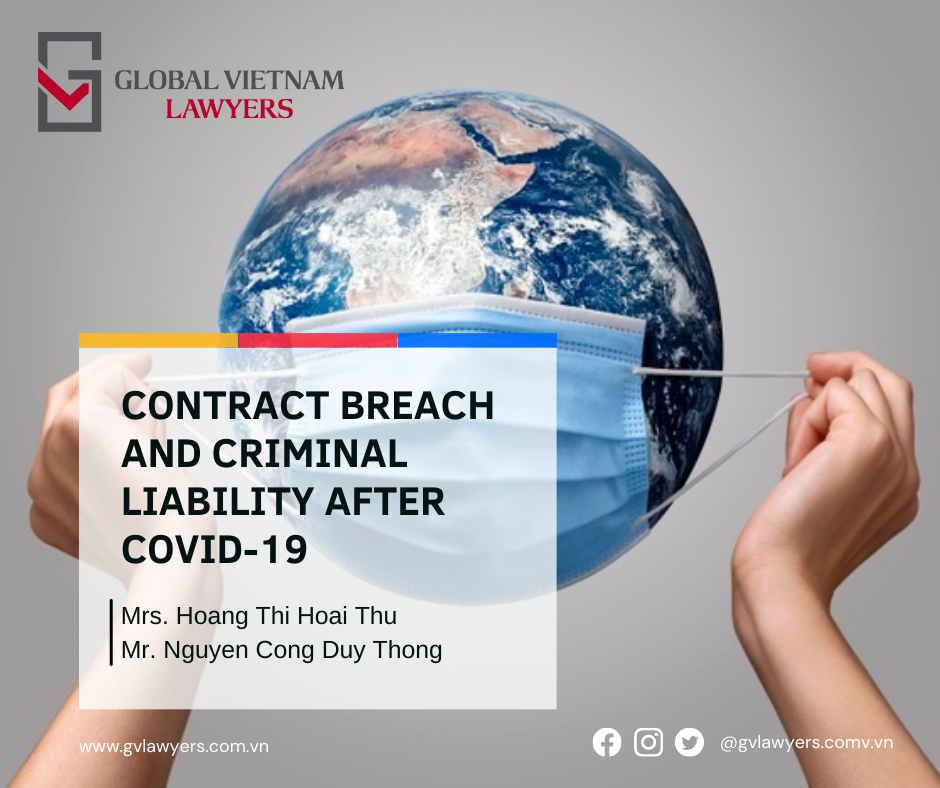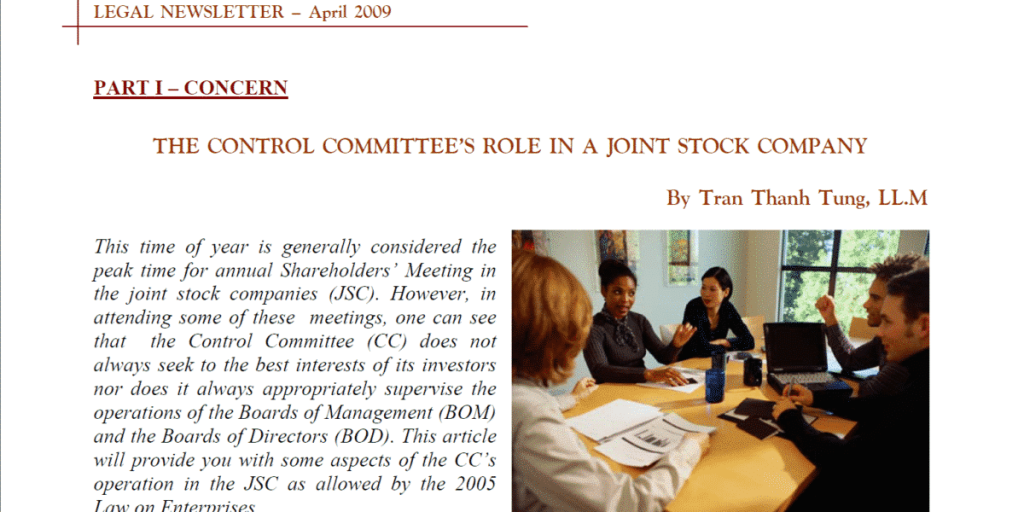GV Lawyers would like to introduce our valued readers an article by Lawyer Hoang Thi Hoai Thu and Assistant Attorney Nguyen Cong Duy Thong titled “Contract breach and criminal liability after Covid-19” posted on the Vietnam Lawyers Electronic Journal on 28/10/2021.
***
(LSVN) – A breach of a contractual obligation is not a crime, a person who violates a contractual obligation, whether an individual or a commercial legal entity, will only take civil liability towards the breached party. However, for each specific case, if the party violating the contract is an individual, intentionally evading in order to appropriate the aggrieved party’s property, that individual may be examined for criminal prosecution.
The Covid-19 epidemic has been causing a lot of difficulties to the Vietnamese economy in general and the provinces under its direct impact in particular. Many measures to limit the epidemic spread have been implemented, including social distancing according to Directive 16/CT-TTg dated 31/03/2021 of the Prime Minister. Accordingly, businesses providing non-essential services must suspend operations. For businesses that are allowed to operate, they must meet the epidemic prevention and control conditions and carry out production and business in the form of “3 on-site” operation or “1 route between 2 places” movement, and at the same time must ensure carry out periodic testing for the workforce at the enterprise.
This situation has thrown into difficulties not only suspended businesses but also businesses that are allowed to operate. As a result, many contracts have been signed but one or more parties cannot meet the agreed terms, leading to a breach of contractual obligations, even a “break of contract” is predictable in many transactions. Faced with such situation, many businesses and individuals have worried whether businesses or individuals breaching contractual obligations due to any epidemic or other obstacles will have to bear criminal responsibility, or whether they merely take civil liability towards the violated party?
In what cases will they be criminally penalized for breach of contractual obligations?
Criminal liability is the offender’s responsibility for bearing the impact of the State’s coercive measures and the penalties prescribed by the penal code. This is the responsibility to bear the legal consequences of criminal acts against the State, not against the person or organization whose legitimate rights or interests are directly infringed by the criminal act. The purpose of criminal liability is to deprive or limit the offenders of some legitimate rights or interests, to punish, and at the same time to educate them to obey the law, not to re-offend, commit a new crime.
According to the Civil Code 2015 (CC 2015), the Commercial Law 2005, the party that violates the contractual obligations will have to bear civil liability towards the breached party. In fact, many cases of breaching contractual obligations and having to bear civil liability but intentionally evading performance of the responsibility towards the aggrieved party, since then the breaching party has suffered criminal liability in belated regrets as in the following cases:
N.V.T., former Deputy Chief Justice of a District People’s Court, signed a credit contract with a bank to borrow VND 250 million, with a loan term of 36 months from 08/07/2014. T. has paid the debt until 25/12/2014. After that, the bank repeatedly asked T. to pay and even went to T.’s office to notify the overdue debt. T. signed a working record and overdue debt notice but failed to do so, and fled his residence. On 06/04/2020, T. was arrested under a wanted warrant. After the process of investigation, prosecution and trial, the Trial Panel sentenced T. to 30 months in prison for the crime of “abusing trust to appropriate property”.
It can be seen that with the act of violating the debt repayment obligation under the credit contract, T. should only have been held civilly responsible to the bank, but T.’s intentional escape so as to evade payment of the debt and appropriate the bank’s money has constituted a crime and was prosecuted for criminal liability.
The said example is the case of an individual who violates his contractual obligations and incurs legal liability when he intentionally evades. So, what will be the responsibility of commercial legal entities that violate the contract, is it possible to be prosecuted for criminal liability?
According to the Criminal Code 2015, commercial legal entities are only criminally responsible for certain crimes such as “Smuggling”, “Illegal transportation of goods and currency across borders”, “Manufacturing and trading in counterfeit goods”;… Beyond this scope, the commercial legal entity will not be charged with other counts. Therefore, if violating a contractual obligation, then intentionally evading the performance of civil liability, the commercial legal entity may be subject to the application of the prescribed measures by the competent authority to force the performance of civil liability towards the aggrieved party.
In short, a breach of a contractual obligation is not a crime, the person who violates a contractual obligation, whether an individual or a commercial legal entity, will only be liable to the aggrieved party. However, for each specific case, if the party violating the contract is an individual intentionally evading in order to appropriate the aggrieved party’s property, that individual may be examined for criminal prosecution.

It is whether a violation of contractual obligations caused by the Covid-19 epidemic will be criminally responsible.
According to the CC 2015, the obligor that violates the obligation shall bear civil liability towards the obligee. However, not in every case the violator shall bear civil liability towards the aggrieved party. For example, if the breaching party fails to properly perform its obligations due to a force majeure event or due to the implementation of a decision of a competent state management agency that the parties cannot know at the time of entering into the contract, violating parties are not liable for civil liability, unless otherwise agreed or otherwise provided by law in accordance with the CC 2015 and the Commercial Law 2005.
Upon applying the said exemption provisions to the case where a contract has been signed but either party cannot perform its obligations in the context of the outbreak of the Covid-19 epidemic, the following possibilities may arise: (i) the parties could not have foreseen the outbreak of an epidemic, when an epidemic occurred, either party tried all ways but could not perform its obligations, (ii) not directly from the epidemic but due to a decision on the implementation of social distancing by the competent authority where either party is forced to breach its obligations without overcoming this despite having tried every way. Depending on each case, the Covid-19 epidemic or a decision of a competent authority will become a force majeure event, enabling the violating party to be exempted from civil liability towards the violated party. In this case, the violating party will not be prosecuted for penal liability because it only violates the civil obligation due to force majeure events, and does not intentionally appropriate the property of the aggrieved party. However, it should be noted that the violating party should not arbitrarily refer to the Covid-19 epidemic or a decision of a competent authority as a force majeure event in order to be exempted from performing obligations and from civil liability. Because, if the breaching party fails to perform its contractual obligations and the conditions of force majeure events (objective, unforeseen, irreparable) are not guaranteed, the breaching party is likely to bear legal consequences.
In addition, if the force majeure event no longer exists, that is, the epidemic situation improves or the decision of the competent authority on social distancing is abolished, the violating party that is no longer hindered by force majeure event must be obliged to continue to perform the contract (unless the parties agree to terminate the contract). At that time, if the violating party fails to perform its obligations, intentionally evades it in order to appropriate the property of the violated party, it is likely that the violating party will be examined for criminal prosecution.
Solutions for the parties to protect their legitimate rights and interests
Currently, social distancing has been eased, but epidemic control measures are still being strengthened. Businesses have gradually resumed operations, but have not yet been able to recover immediately under the “new normalcy”. Therefore, the violation incidents and their consequences will be difficult to handle satisfactorily and promptly. In order to be able to maintain the partnership but still legally protect their interests in order to survive and develop in the “new normalcy” and “living with the epidemic”, the question is raised: what businesses and individuals who signed the contract should do?
For the breached party: If it is not possible to negotiate together, depending on the subject that has entered into the contract, the aggrieved party may choose the appropriate solution as follows:
– If the subject entering into a contract with them is a commercial legal entity or other organizations, the two parties may request an intermediary mediation unit or competent jurisdiction to resolve the dispute.
– If the subject of entering the contract with him is an individual, the violating party can also choose the said settlement method. However, when realizing that the violating individuals intentionally appropriate their property, the aggrieved party may request the competent authority to examine and impose the criminal liability on the violator, and at the same time any claim for damages.
For the violating party: Evading the performance of obligations is not be allowed, it should be proactive in proposing possible solutions for the parties to consider and come to an agreement. In addition, it is necessary to stay calm before threats to criminalize civil disputes because they may just be groundless accusations to pressure the violator.
At the same time, the violating party can contact law-practicing organizations for advice and assistance in negotiating with the aggrieved party as well as avoiding potential risks and minimizing the risk of constituting any crime.





